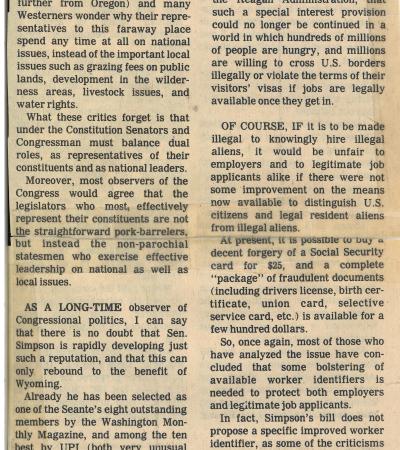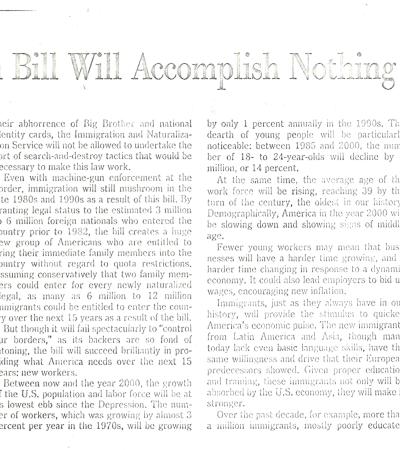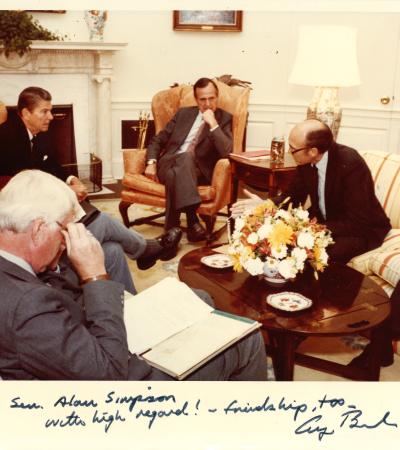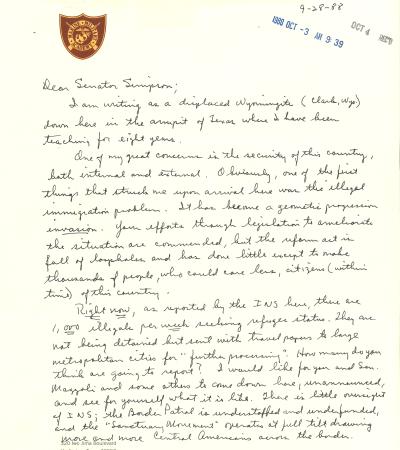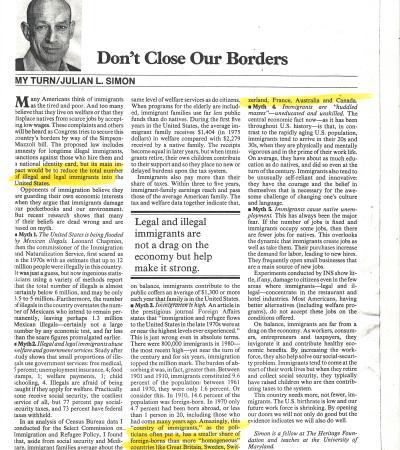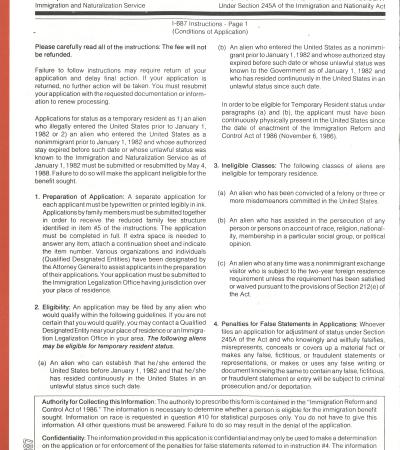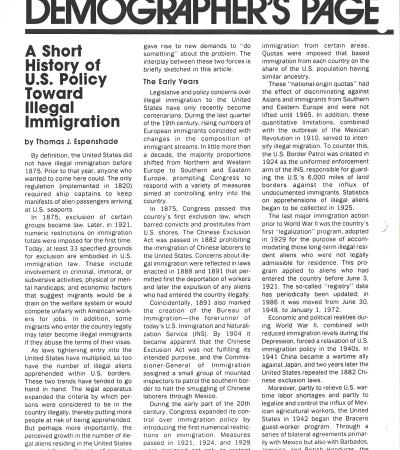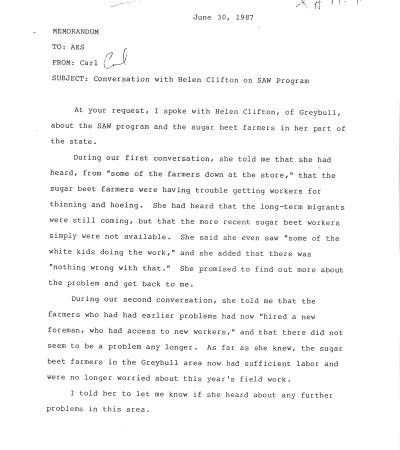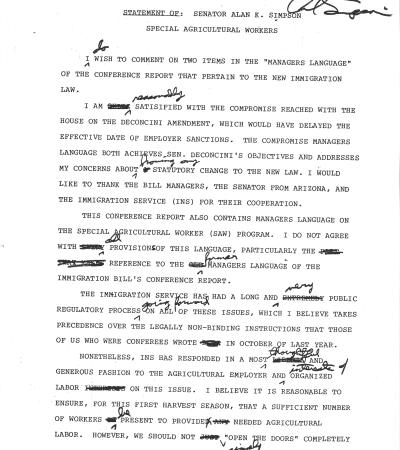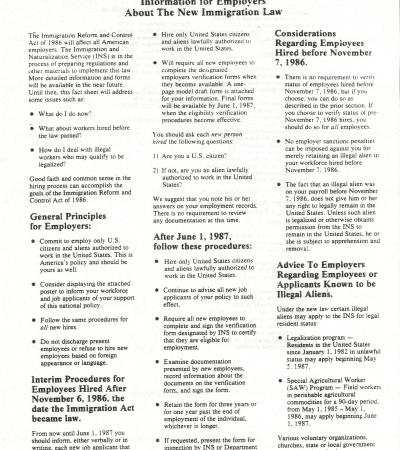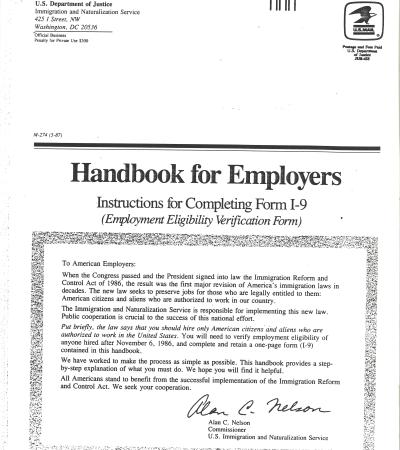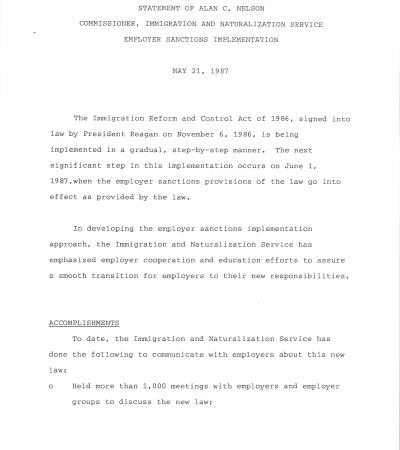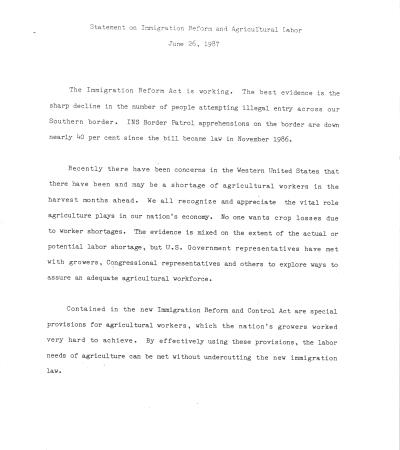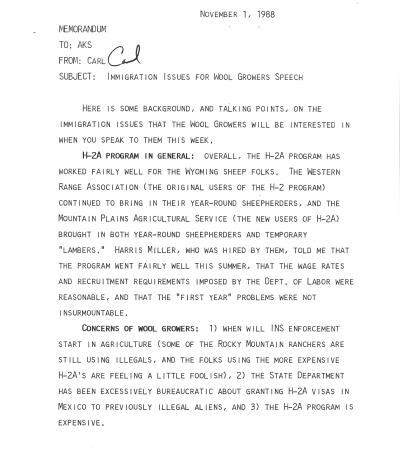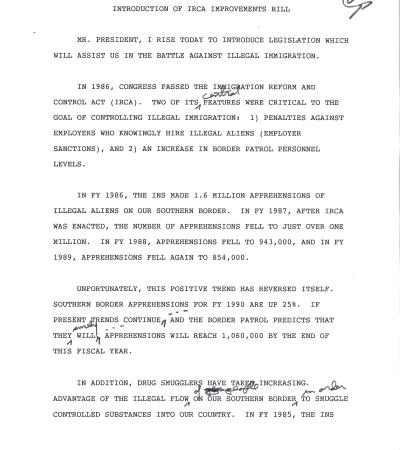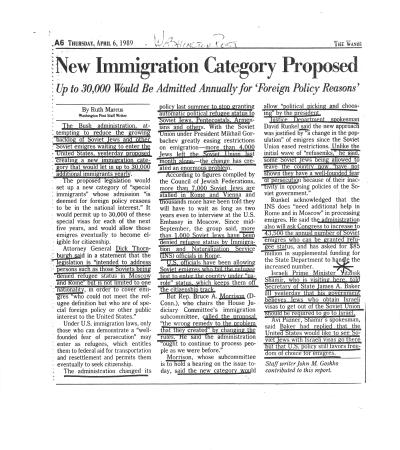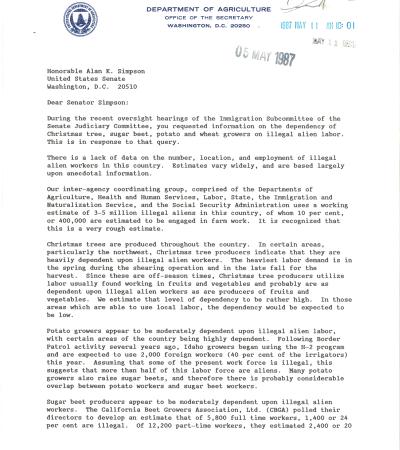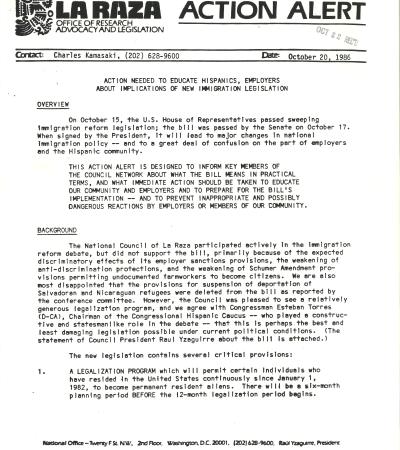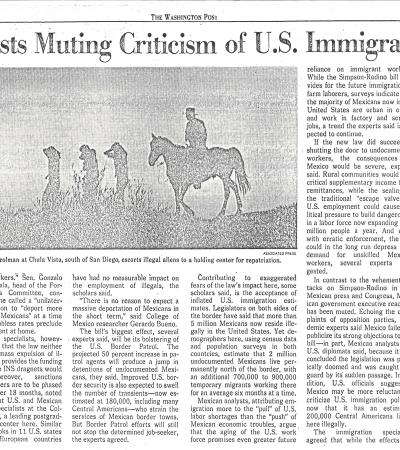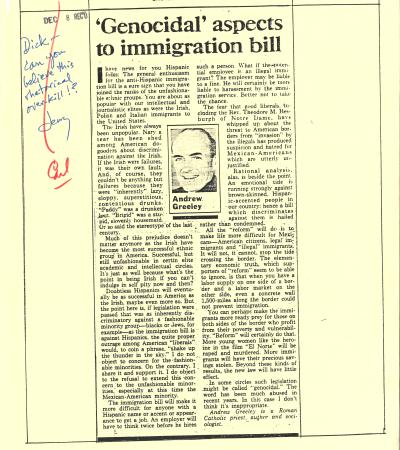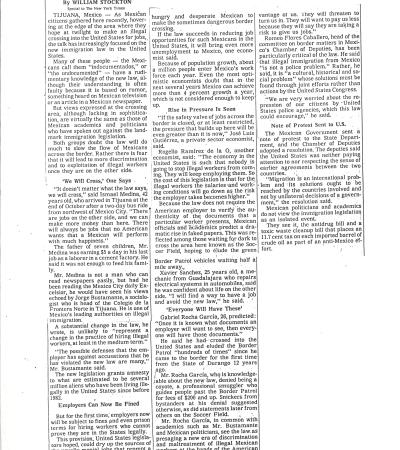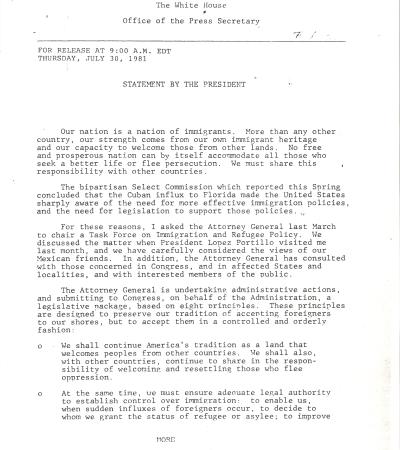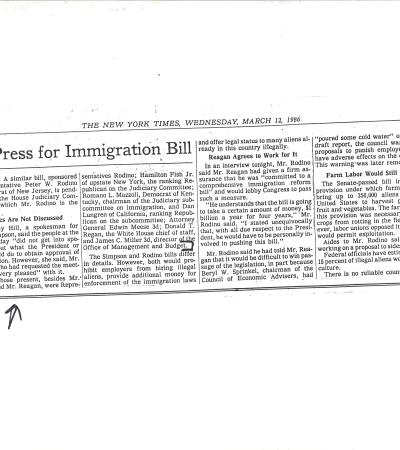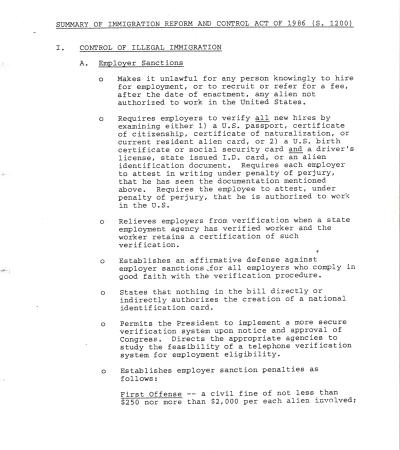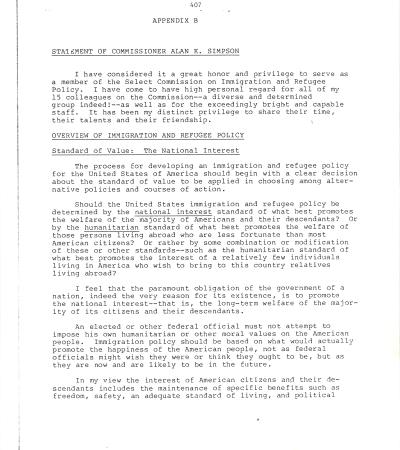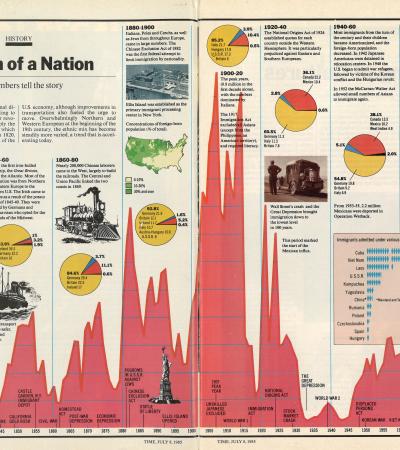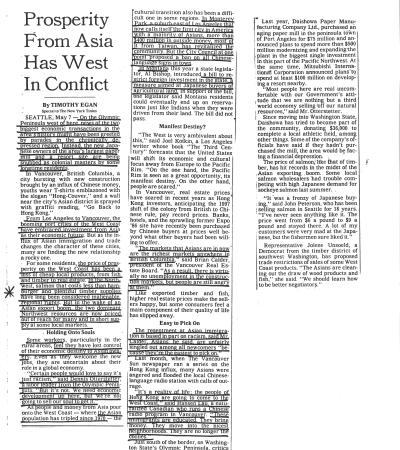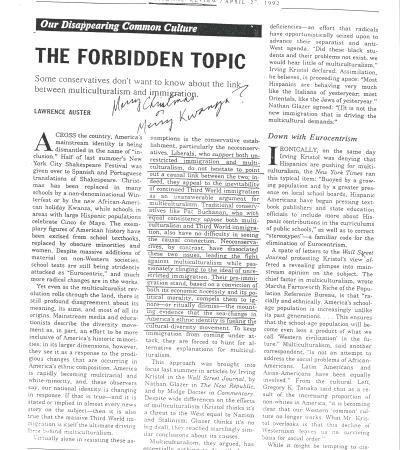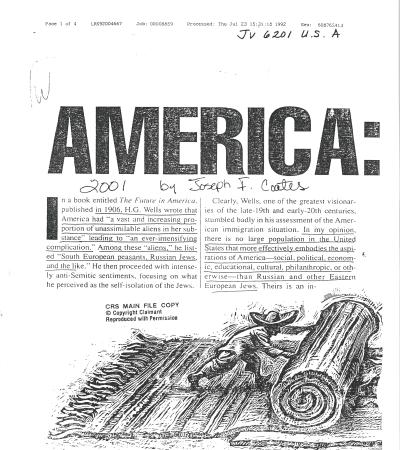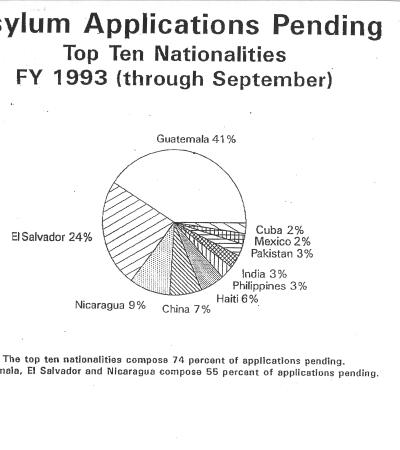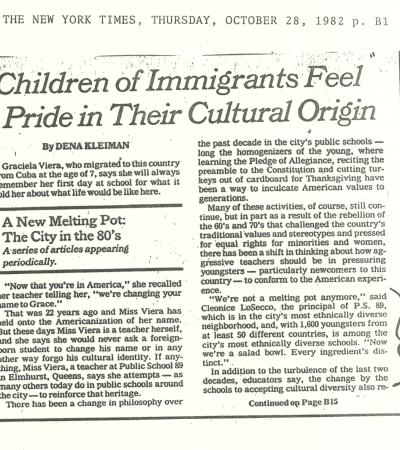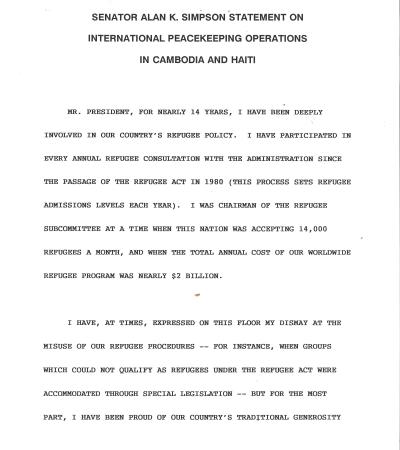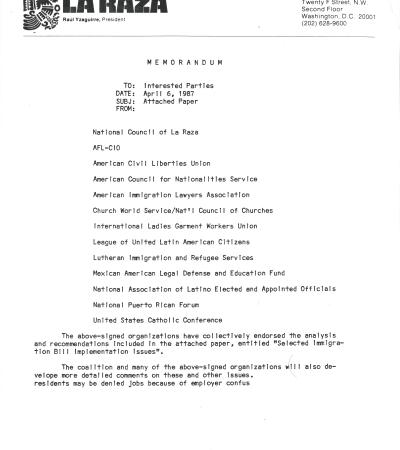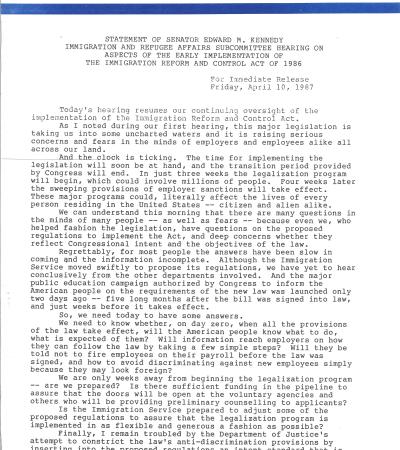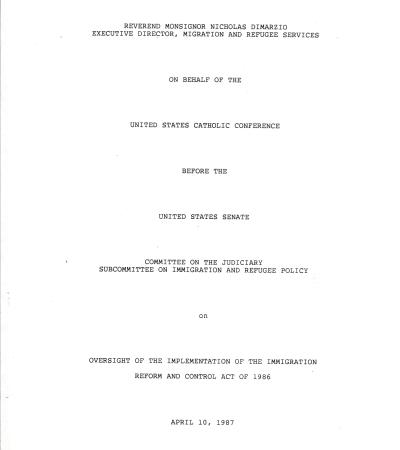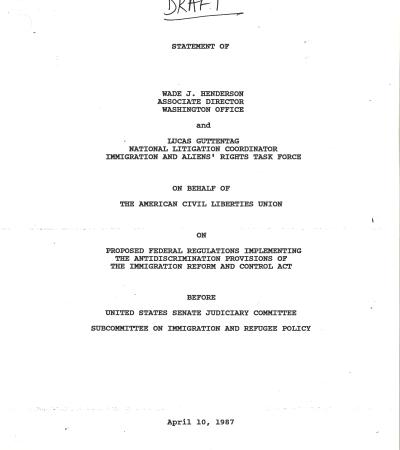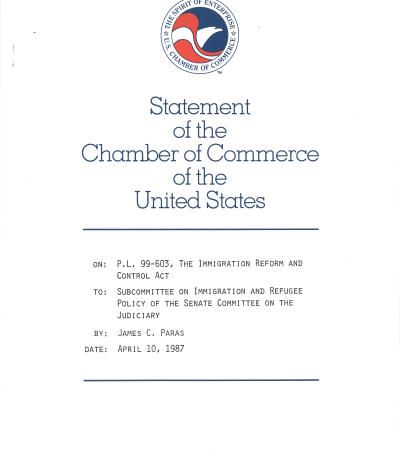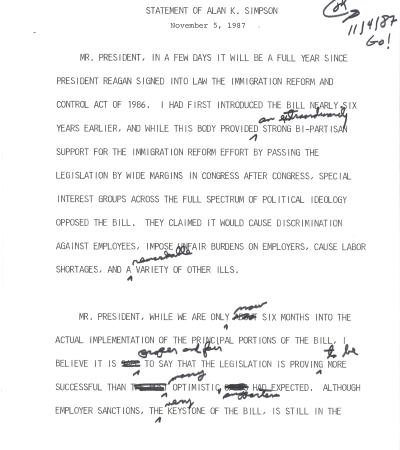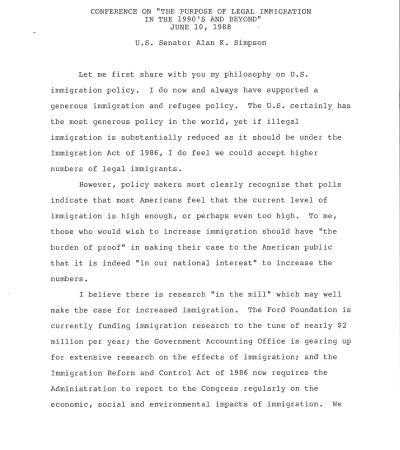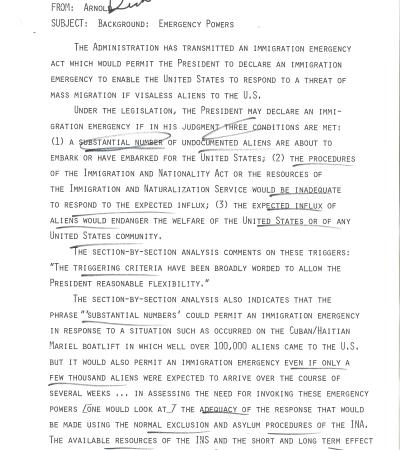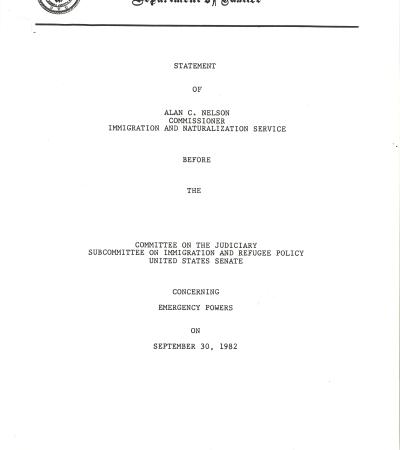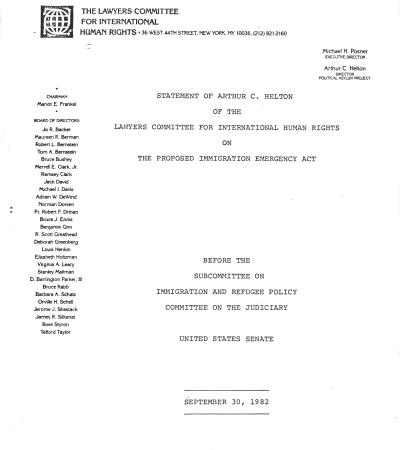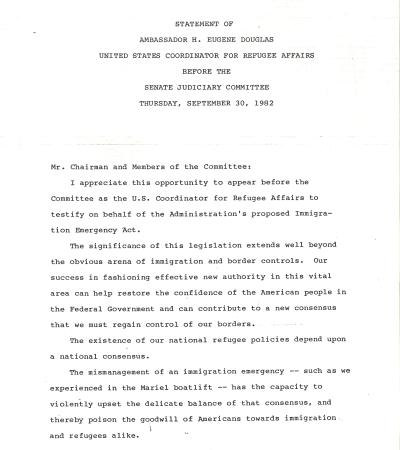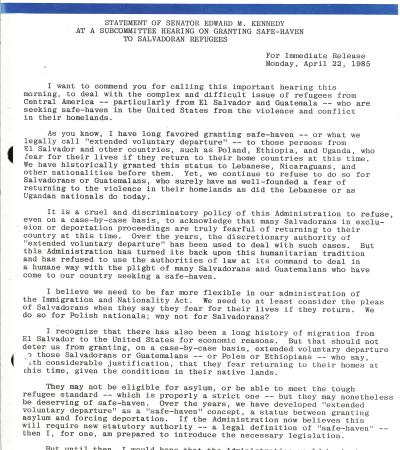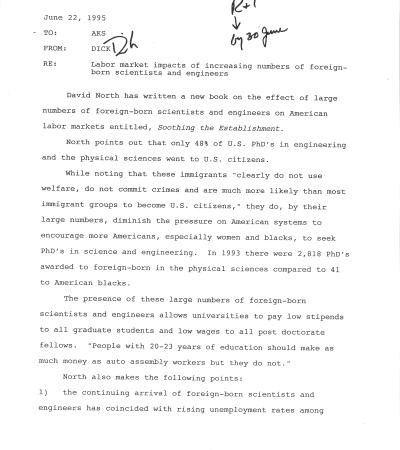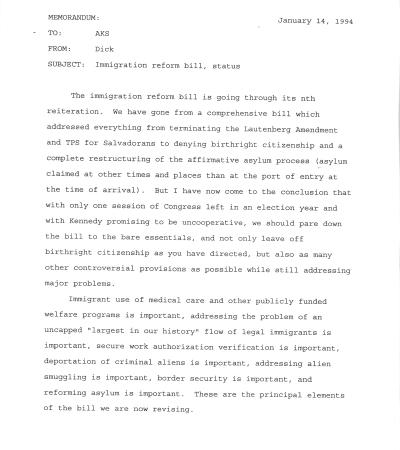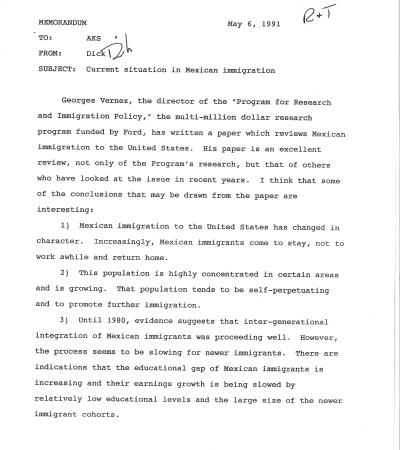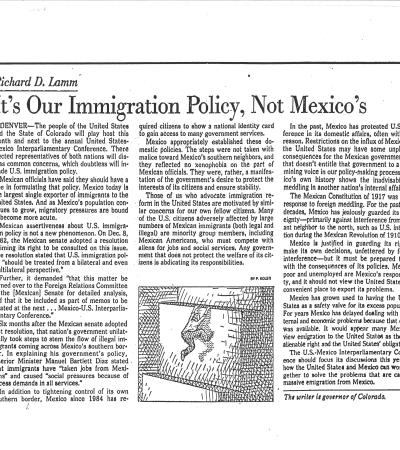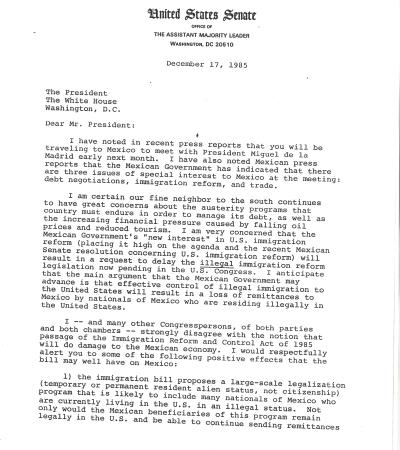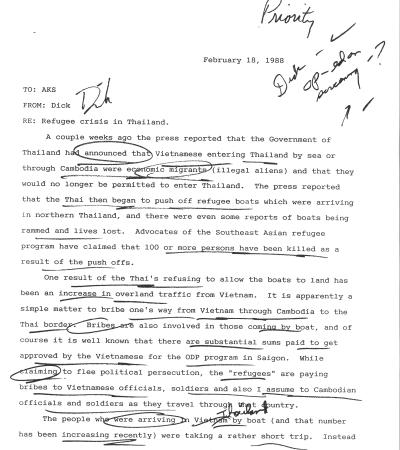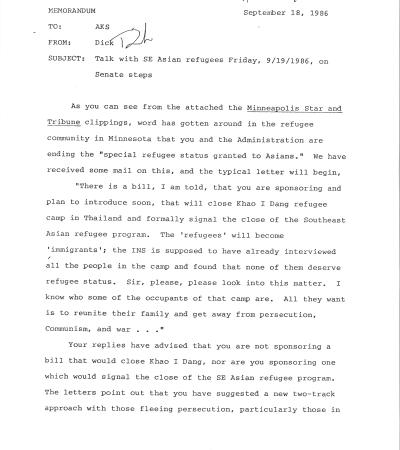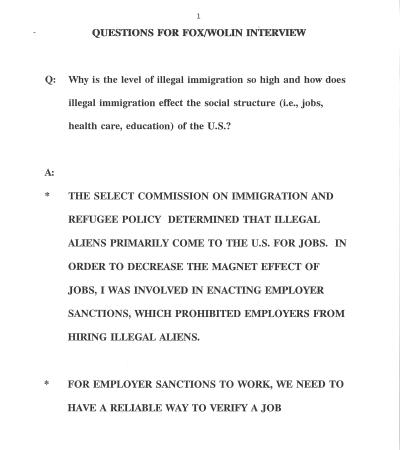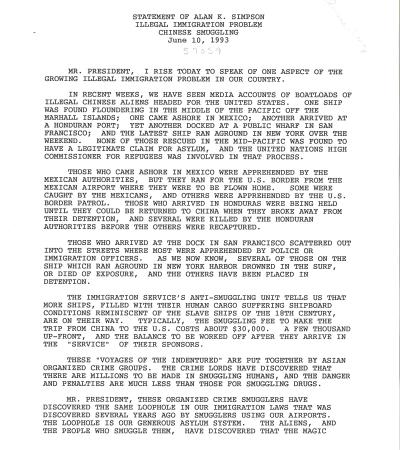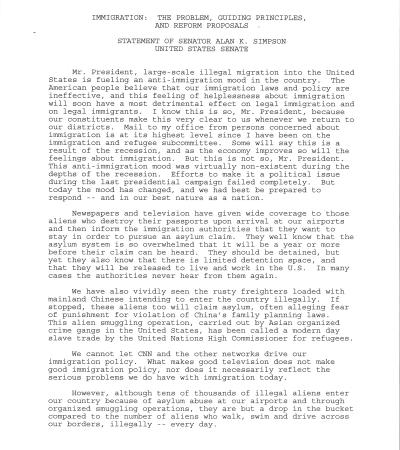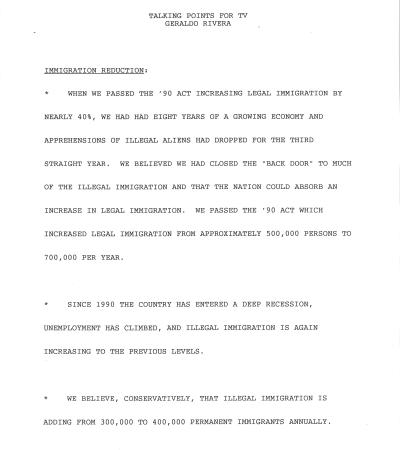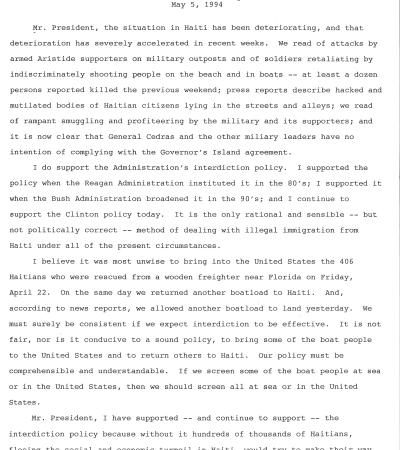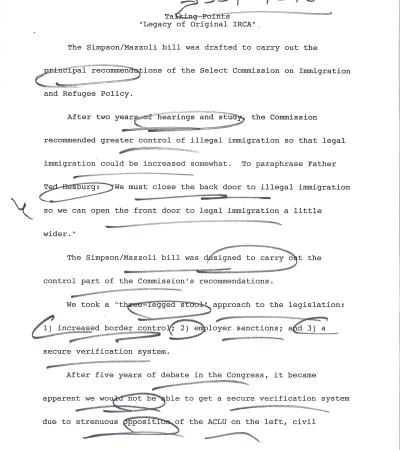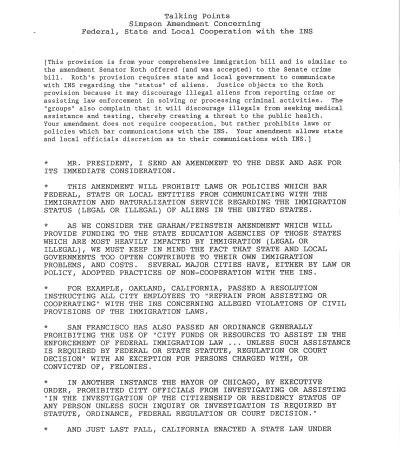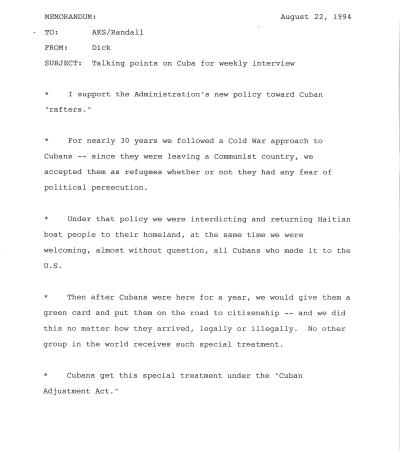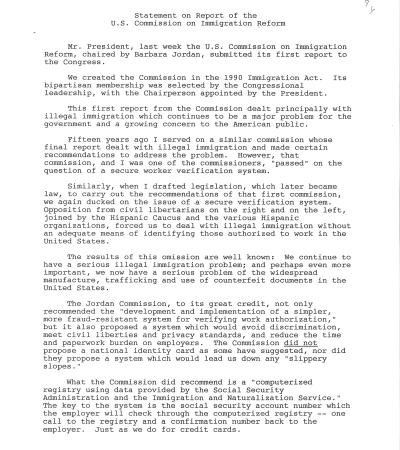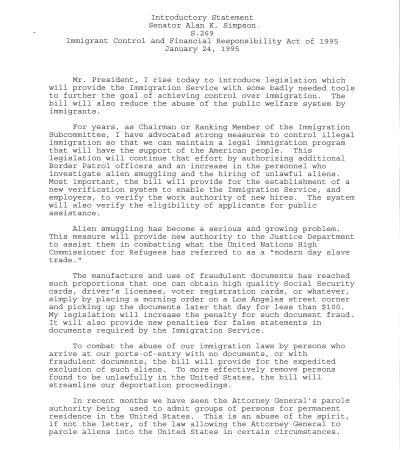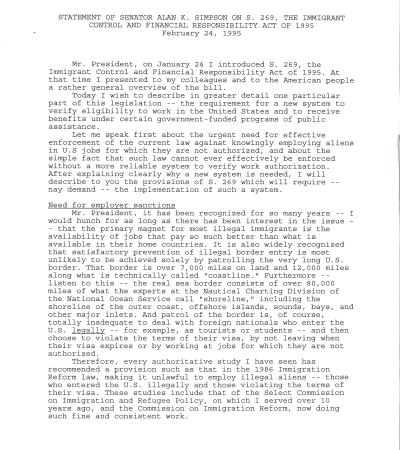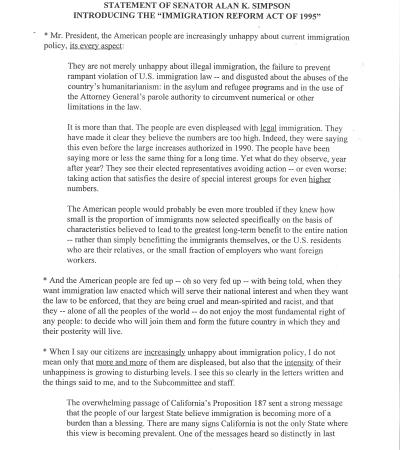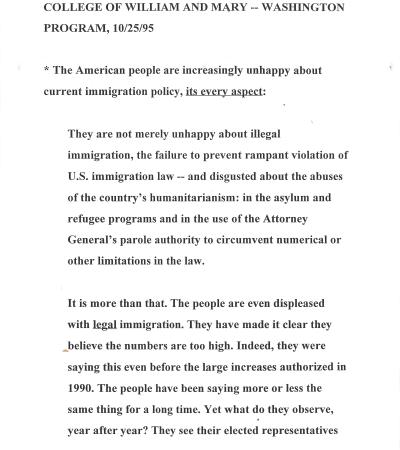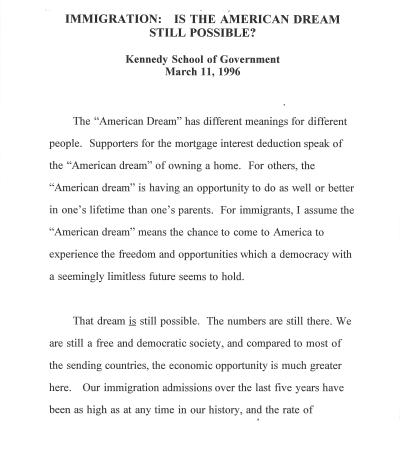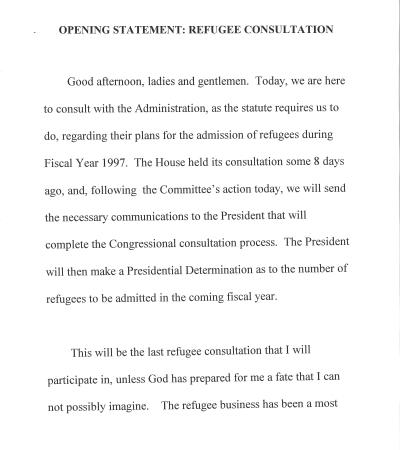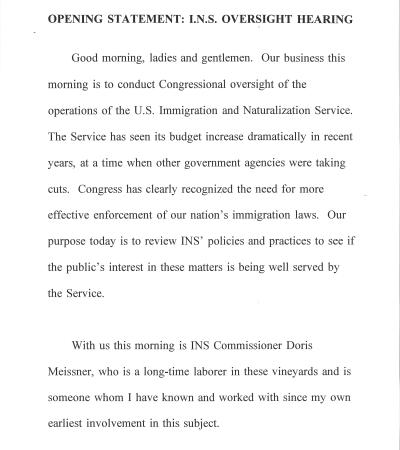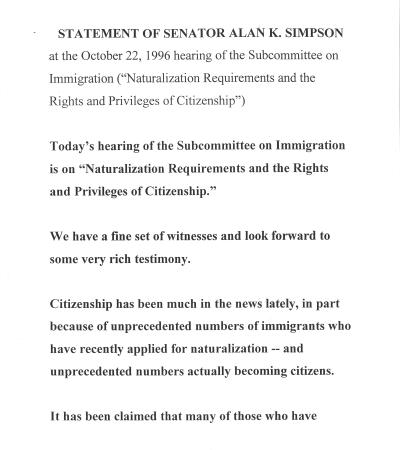Alan K. Simpson (1931-2025) was a Wyoming politician. A Republican, he served as a United States Senator from 1979 to 1997. He was appointed to the post following the resignation of Senator Clifford P. Hansen, and he was subsequently re-elected. Simpson’s papers contain hundreds of files related to his role as the ranking member of the Senate Judiciary Subcommittee on Immigration. He was the Senate’s lead sponsor of the Immigration Reform and Control Act of 1986 and he sponsored other legislation related to immigration during his time in Washington D.C.
"Simpson sets high tone with immigration bill" by Michael S. Teitelbaum, Casper Star Tribune, May 28, 1982
This article discusses the work of U.S. Senator Alan K. Simpson on an immigration bill in 1982. The proposed bill was a product of a joint effort with Simpson's Senate Subcomittee on Immigration and a similar subcommittee in the House of Representatives chaired by Congressman Romano Mazzoli.
"The Immigration Bill Will Accomplish Nothing" by William B. Johnston, November 1986
This article suggests that, despite congressional success in passing the Immigration Reform and Control Act of 1986, immigration is likely to increase in the future. It concludes that immigration is ultimately a positive for U.S. economic growth.
Photograph of Senator Simpson with President Reagan, Vice President Bush and others, June 1, 1981
This photo was taken in the Oval Office at the White House as Senator Alan Simpson was briefing the President and his staff on immigration reform. Shortly after the picture was taken, President Reagan said "I think you're ruining my day with these figures!"
Correspondence between Alton Windsor and Senator Simpson, 1988
The correspondence between Simpson and Windsor is representative of the issues raised as the Immigration Reform and Control Act was implemented.
"Don't Close Our Borders" by Julian L. Simon, Newsweek, February 27, 1984
This article covers 5 myths of immigration and concludes that, on balance, immigrants help drive a healthy economy.
Form I-687 Application For Status As A Temporary Resident
This form was introduced as part of the Immigration Reform and Control Act of 1986. It was to be filled out by those who had entered the U.S. illegally before January 1, 1982 and who were eligible for temporary resident status.
"A Short History of U.S. Policy Toward Illegal Immigration" by Thomas J. Espenshade, Population Today, February 1990
This article reviews the history of illegal immigration in the U.S. and the impact of the Immigration Reform and Control Act on immigration since its implementation in 1987.
Memo from Carl to Alan K. Simpson, June 30, 1987
This memo covers a conversation between Carl, from Senator Simpson's office, and Helen Clifton, of Greybull, Wyoming. The topic of discussion was the Special Agricultural Workers (SAW) program and its impact on sugar beet farmers.
Statement of Senator Alan K. Simpson on Special Agricultural Workers, 1987
This statement expresses Simpson's opinions about the Special Agricultural Workers (SAW) program and its role in addressing a potential agricultural labor shortage in the U.S.
Information for Employers About The New Immigration Law
This document, prepared by the U.S. Immigration and Naturalization Service (INS), explains the impact of the Immigration Reform and Control Act of 1986 on employers across the U.S.
Handbook for Employers
This document, prepared by the U.S. Immigration and Naturalization Service (INS), explains aspects of the Immigration Reform and Control Act of 1986. It introduces the I-9 Form and lists penalties for failure to comply with the new law. It also answers a number of questions employers might have about the I-9.
Statement of Alan C. Nelson on Employer Sanctions Implementation, May 21, 1987
This statement, issued by the commissioner of the Immigration and Naturalization Service, explains that the Immigration Reform and Control Act of 1986 will be implemented gradually.
Statement on Immigration Reform and Agricultural Labor, June 26, 1987
This statement describes progress on the implementation of the Immigration Reform and Control Act and addresses actions being taken to counter a possible shortage of agricultural workers in the Western U.S. in 1987.
Memo from Carl to Alan K. Simpson, November 1, 1988
The memo covers background and talking points for Senator Simpson regarding immigration and the Wyoming Wool Growers Association. It provides insight into the hiring of immigrant sheepherders in Wyoming and the impact of immigration laws.
Statement of Senator Alan K. Simpson on the Introduction of IRCA Improvements Bill, 1990
The statement, delivered by Senator Simpson before the U.S. Senate, outlines trends in apprehensions of illegal aliens along the southern border of the U.S. It also proposes legislation to construct more barriers along the border and to implement other measures to reduce the use of fraudulent documents by those illegal immigrants seeking employment in the U.S.
"New Immigration Category Proposed" by Ruth Marcus, The Washington Post, April 6, 1989
This article covers the proposed introduction of a new immigration category to allow for the immigration of Soviet Jews to the U.S. for foreign policy reasons.
Letter from Ewen Wilson to Senator Alan K. Simpson, May 5, 1987
This letter from the acting assistant secretary for economics in the U.S. Department of Labor discusses the dependency of illegal alien labor in the Christmas tree, sugar beet, potato and wheat growing industries.
La Raza Action Alert, October 20, 1986
This memo is from the National Council of La Raza, a Hispanic advocacy group. It was intended to inform Hispanics about the implications of the Immigration Reform and Control Act of 1986 and to help prevent inappropriate reactions by employers or community members.
"Mexican Analysts Muting Criticism of U.S. Immigration Bill" by William A. Orme Jr., The Washington Post, November 3, 1986
This article discusses the reaction of Mexican government officials and academics to the Immigration Reform and Control Act of 1986. It also speculates on effects and consequences of the legislation for the U.S. and Mexico.
"'Genocidal' aspects to immigration bill" by Andrew Greely, Chicago Sun-Times, October 26, 1986
This article, written by a Catholic priest, draws parallels between Hispanic immigration and Irish immigration of an earlier era. The author concludes that the Immigration Reform and Control Act of 1986 will make life more difficult for Mexican-Americans, legal immigrants and illegal immigrants.
"Mexicans Expecting No Good of Immigration Law" by William Stockton, The New York Times, November 6, 1986
This articles provides the perspective of several Mexicans considering making an illegal crossing into the U.S. to find work. It concludes that migration is an internatioinal problem and that the solution should not be a unilateral decision made by a single government.
Statement by President Ronald Reagan, July 30, 1981
This statement by the U.S. President addresses his administration's principles around immigration and the plan to work toward a new immigration policy.
"Reagan Agrees to Press for Immigration Bill" by Robert Pear, The New York Times, March 12, 1986
This article discusses the support of President Reagan for a comprehensive immigration reform bill. The legislation was to be designed to stop the flow of illegal aliens into the U.S.
Summary of Immigration Reform and Control Act of 1986 (S. 1200)
This document outlines aspects of the Immigration Reform and Control Act of 1986. These include employer sanctions, anti-discrimination measures and plans for legalization of eligible aliens.
Statement of Commissioner Alan K. Simpson, March 1, 1981
Senator Alan K. Simpson, in his capacity as a Commissioner on the Select Commission on Immigration and Refugee Policy, provided this statement to the U.S. Congress and President Reagan. It provides insight into his opinions on U.S. immigration policy and the national interest.
Opinion Piece for the Dallas Morning News, July 1984
This opinion piece describes trends in immigration and outlines aspects of the Simpson-Mazzoli immigration bill. It specifically notes the bill's focus on illegal immigration, while not impacting legal immigration. It also addresses concerns about whether the legislation would introduce a national I.D. card.
"Growth of a Nation", Time, July 8, 1985
This graphic from Time magazine summarizes the history of U.S. immigration from 1820 to 1984. Notable is the shift in ethnic mix of immigrants, from primarily European through the 1940s, to a truly global influx in the 1980s.
"Prosperity From Asia Has West In Conflict" by Timothy Egan, The New York Times, May 8, 1989
This article discusses the influx of Asian immigrants on the West Coast of the U.S. In particular, some wealthy Chinese immigrants from Hong Kong and immigrants from Taiwan have made investments in the Western U.S., driving up real estate prices and inciting resentment.
"The Forbidden Topic" by Lawrence Auster, National Review, April 27, 1992
This article critiques the impact of multiculturalism on America's national identity, arguing that mainstream American culture is being dismantled in favor of inclusion. Auster links increasing Third World immigration to multiculturalism, contending that demographic shifts are fueling demands for cultural diversity.
"America: 2001" by Joseph F. Coates
The article argues that America has historically been successful at assimilating diverse immigrant groups, such as Eastern European Jews and Italians. However, it warns that this model of assimilation is being challenged by newer immigration patterns, particularly among Mexicans, due to geographic proximity, illegal migration, and bilingual education policies.
Asylum Graphs, 1993
These two graphs show Asylum Applications Pending and Filed for part of fiscal year 1993. The graphs give insight into which countries immigrants are coming from as they try to seek asylum and immigrate legally into the U.S.
"Children of Immigrants Feel Pride in Their Cultural Origin" by Dena Kleiman, The New York Times, October 28, 1982
The article discusses the shift in American schools from assimilation-focused education to education that embraces cultural diversity, as seen through the experiences of immigrant children and their families. Teachers and school administrators now encourage students to take pride in their heritage rather than feeling pressured to conform exclusively to American customs.
Senator Alan K. Simpson Statement on International Peacekeeping Operations in Cambodia and Haiti
Senator Simpson's statement discusses the United States' role in international peacekeeping efforts in Cambodia and Haiti. He highlights the significant financial burden the U.S. has borne in resettling immigrant refugees, arguing that successful peacekeeping operations would ultimately reduce long-term costs and human suffering. He urges his colleagues to approve funding for these efforts.
La Raza Memorandum Regarding Immigration Bill Implementation Issues, April 6, 1987
The memorandum discusses the implementation issues of the Immigration Reform and Control Act of 1986 (IRCA). It highlights concerns over restrictive regulations regarding legalization, employer sanctions, and public education, emphasizing the need for broader interpretations of continuous residence, more flexible documentation requirements, and protection against discriminatory employment practices.
Statement by Senator Edward M. Kennedy, April 10, 1987
Senator Kennedy's statement discusses the early implementation challenges of the Immigration Reform and Control Act of 1986, highlighting concerns over employer sanctions and the legalization program set to begin soon. He raises questions about whether employers and employees will be adequately informed and prepared.
Testimony of Reverend Nicholas Dimarzio Regarding the Immigration Reform and Control Act of 1986, April 10, 1987
Dimarzio, representing the U.S. Catholic Conference, delivered this testimony before the U.S. Senate Judiciary Subcommittee on Immigration and Refugee Policy, regarding the implementation of the Immigration Reform and Control Act of 1986. His testimony is representative of the many Catholic charities that were involved in helping immigrants.
Statement of Wade J. Henderson Regarding the Immigration Reform and Control Act of 1986, April 10, 1987
Henderson, on behalf of the ACLU, addresses concerns regarding the implementation of the anti-discrimination provisions of the Immigration Reform and Control Act (IRCA) of 1986. His remarks highlight the failure of the Department of Justice to establish the Office of Special Counsel to enforce anti-discrimination measures, leading to widespread employment discrimination against non-citizens and minorities due to employer fears of violating immigration laws.
Statement of James C. Paras Regarding the Immigration Reform and Control Act of 1986, April 10, 1987
Paras, on behalf of the U.S. Chamber of Commerce, expresses the organization's concerns regarding the implementation of the Immigration Reform and Control Act (IRCA) of 1986. The Chamber acknowledges the importance of employer compliance but highlights challenges businesses face, such as complex documentation requirements, legal liabilities, and inadequate public education efforts.
Statement of Senator Alan K. Simpson, November 5, 1987
Simpson's statement provides his perspective on the first year of the Immigration Reform and Control Act of 1986, emphasizing its success in reducing illegal immigration and employer compliance with sanctions. He notes that fears of widespread discrimination and labor shortages have not materialized, and the legalization program is proceeding as expected, with application numbers aligning with congressional estimates.
Speech by Senator Alan K. Simpson at the Conference on The Purpose of Legal Immigration in the 1990s and Beyond, June 10, 1988
Simpson's remarks give insight to his views on immigration. He emphasizes the need for a balanced and structured approach to legal immigration and advocates for policies that prioritize family unity, attract skilled workers, provide needed labor, and offer refuge to political asylum seekers, while stressing that immigration levels should be periodically reviewed to align with national interests.
Memo from Arnold to Alan K. Simpson, September 29, 1982
The memo discusses the proposed Immigration Emergency Act, which would allow the President to declare an immigration emergency in response to mass migration threats. It outlines the broad criteria for such a declaration, the powers granted to the President under the act—including restricting travel and detaining migrants—and the legal and historical context of emergency powers in the U.S.
Statement of Alan C. Nelson Concerning Emergency Powers, September 30, 1982
Nelson, Commissioner of the Immigration and Naturalization Service, discusses the proposed Immigration Emergency Bill, aimed at addressing mass immigration crises like the 1980 Mariel boatlift. He argues that existing laws were inadequate to control sudden large-scale arrivals of undocumented immigrants, highlighting the need for clearer presidential emergency powers to detain inadmissible aliens and ensure national security.
Statement of Arthur C. Helton, September 30, 1982
Helton, representing the Lawyers Committee for International Human Rights, criticizes the proposed Immigration Emergency Act and argues that its provisions for interdiction and detention of arriving asylum seekers violate domestic and international law. He highlights that these measures would deter asylum seekers from pursuing their claims and subject them to prolonged imprisonment under harsh conditions. He suggests using international cooperation to handle mass refugee influxes while upholding humanitarian principles.
Statement of Ambassador H. Eugene Douglas, September 30, 1982
Douglas, the U.S. Coordinator for Refugee Affairs, testified before the Senate Judiciary Committee in support of the Reagan Administration's proposed Immigration Emergency Act. He emphasized the need for stronger immigration controls to restore public confidence, citing past mismanagement, such as the Mariel boatlift, which strained resources and undermined goodwill toward immigration and refugee policies.
Statement of Senator Edward M. Kennedy on Granting Safe-Haven to Salvadoran Refugees, April 22, 1985
Kennedy advocates for granting safe-haven status to Salvadoran and Guatemalan refugees fleeing violence, arguing that the U.S. has historically extended such protections to other nationalities. He criticizes the administration’s refusal to acknowledge their fear of returning home and calls for greater flexibility in immigration policy, in the same way that Polish and Ethiopian refugees have been treated.
Memo from Dick to Alan K. Simpson, June 22, 1995
The memo discusses the labor market impact of increasing numbers of foreign-born scientists and engineers in the U.S. It highlights how the presence of immigrants reduces incentives for universities and industries to encourage more American citizens, particularly underrepresented groups like women and Black Americans, to pursue PhDs in science and engineering.
Memo from Dick to Alan K. Simpson, January 14, 1994
This memo and a series of questions and answers on the proposed 1994 immigration reform bill provides insight into Simpson's continued work on immigration, even after the Immigration Reform and Control Act of 1986 was implemented.
Memo from Dick to Alan K. Simpson, May 6, 1991
The memorandum and attached research paper discuss the evolving patterns of Mexican immigration to the U.S., highlighting a shift from temporary labor migration to more permanent settlement. Key findings indicate that Mexican immigrants are highly concentrated in certain areas, particularly in the western U.S., where their population growth has significant economic, educational, and policy implications.
"It's Our Immigration Policy, Not Mexico's" by Richard D. Lamm, The Washington Post, May 9, 1986
Lamm, the governor of Colorado, argues that U.S. immigration policy should be determined solely by the United States, not by Mexico, despite Mexico's increasing assertiveness in the matter. He emphasizes that while Mexico has the right to manage its own affairs, it must also take responsibility for its economic and social issues instead of relying on the U.S. as a solution to its excess population.
Letter from Senator Alan K. Simpson to President Ronald Reagan, December 17, 1985
The letter from Simpson to the President, discusses the upcoming meeting with Mexican President Miguel de la Madrid. Simpson expresses concern that Mexico may request a delay in U.S. immigration reform due to fears of reduced remittances from immigrants back to families in Mexico. He outlines how legalization programs, employer sanctions, and agricultural worker provisions in the bill would improve wages and conditions for Mexican nationals in the U.S. while maintaining strong U.S.-Mexico relations.
"Which Armenians Are Refugees?", The New York Times, June 6, 1988
The article discusses the increasing emigration of Armenians from the Soviet Union to the U.S. and the debate over whether they should be classified as political refugees or economic immigrants. While refugees need to demonstrate a genuine fear of persecution, and are generally admitted to the U.S. legally, the numbers of economic immigrants are more restricted.
Memo from Dick to Alan K. Simpson, February 18, 1988
The memo discusses Thailand’s policy shift in 1988 to push back Vietnamese refugees arriving by sea and the resulting increase in overland migration through Cambodia. Reports suggest that these pushbacks led to fatalities, raising concerns among refugee advocates and U.S. officials. The memo also highlights tensions over U.S. immigration and refugee policies, the need for better screening processes, and the political challenges of managing resettlement commitments.
Memo from Dick to Alan K. Simpson, September 18, 1986
This memo and the attached talking points give insight into Simpson's positions on the resettlement of Southeast Asian refugees in the U.S.
Questions and Answers for Fox Television Interview, May 24, 1993
These questions, answers and talking points give Simpson's perspective on illegal immigration generally, and go into more detail specifically on illegal immigration from China.
Statement of Senator Alan K. Simpson on Chinese Smuggling
Simpson's statement addresses illegal immigration focusing on the smuggling of Chinese migrants into the U.S. by organized crime groups. He highlights the exploitation of legal loopholes, particularly in the asylum system, which allows many migrants to gain work authorization and disappear into communities. Simpson urges stronger penalties for human smuggling, better enforcement measures, increased detention capacity, and legislative reforms.
Memo from Dick to Alan K. Simpson, June 28, 1993
The memo outlines key talking points for a public radio interview on immigration issues. It highlights concerns about record-high immigration levels, public opinion favoring reductions, and the need to control illegal immigration through employer sanctions, secure verification systems, and border enforcement. Additionally, it discusses asylum abuse, immigrant assimilation challenges, and the necessity of an open debate in Congress.
Statement of Senator Alan K. Simpson on Immigration, August 6, 1993
Simpson's statement addresses the growing issue of illegal immigration in the U.S., highlighting public concerns about the ineffectiveness of current policies and the financial burden on state and local governments. He outlines key issues such as asylum fraud, human smuggling, border security, and the exploitation of public benefits, advocating for stricter enforcement, detention measures, and overall limitations on immigration.
Talking Points for TV Interivew with Geraldo Rivera, 1994
These talking points, prepared for Senator Simpson to cover during a TV interview, emphasize the need for immigration reduction, citing economic strain, increasing illegal immigration, and the burden on public services. The proposed bill aims to lower legal immigration by 25% for five years, streamline deportation for criminal aliens, tighten asylum and work authorization processes to curb fraud and use former military bases for detention.
Talking Points About The Politicization of U.S. Refugee Policy, 1994
These talking points, prepared for Senator Simpson cover the politicization of U.S. refugee policy, highlighting how special programs have lowered the standard for refugee status for certain groups. It critiques policies like the Lautenberg Amendment for Southeast Asians and the Cuban Adjustment Act, which grant presumed refugee status based on group identity rather than individual proof of persecution.
Statement by Senator Alan K. Simpson on U.S. Haitian Policy, May 5, 1994
Senator Simpson’s statement discusses the deteriorating situation in Haiti and supports the U.S. policy of interdicting Haitian migrants at sea to prevent mass illegal immigration. He criticizes inconsistencies in U.S. refugee policies, arguing that special programs for certain groups undermine credibility and make Haitian interdiction harder to defend. Simpson advocates for a regional refugee processing center and a full blockade against Haiti’s military regime.
Talking Points About the Legacy of the Original IRCA, July 29, 1994
These talking points give Senator Simpson's perspective on the legacy of the Immigration Reform and Control Act (IRCA) eight years after the legislation passed.
Talking Points About the Simpson Amendment Concerning Cooperation with the INS, August 1, 1994
These talking points cover Senator Simpson’s amendment which seeks to prevent federal, state, and local policies that bar communication with the Immigration and Naturalization Service (INS) regarding an individual’s immigration status. While it does not mandate cooperation, it removes restrictions that prevent government entities from reporting immigration violations, particularly in cities that have enacted "sanctuary" policies.
Memo from Dick to Alan K. Simpson, August 22, 1994
The memorandum supports the U.S. administration's new policy of treating Cuban and Haitian migrants equally, ending the special treatment Cubans previously received under the Cuban Adjustment Act. It also highlights concerns about the increasing number of Cuban rafters attempting to illegally immigrate to the U.S., the need for offshore detention facilities, and the potential economic pressure on Cuba from restricting remittances.
Statement on the Report of the U.S. Commission on Immigration Reform, October 6, 1994
Simpson's statement provides an update on the U.S. Commission on Immigration Reform. The Commission recommended the development of a secure, fraud-resistant worker verification system using a computerized registry based on Social Security and Immigration Service data. Despite initial opposition and concerns about costs, the system was proposed as a practical and non-discriminatory solution to address illegal immigration without requiring a national ID card.
Statement of Senator Alan K. Simpson on S.269, January 24, 1995
Simpson's statement introduces legislation (Senate bill 269), also called the Immigrant Control and Financial Responsibility Act of 1995. The bill aims to strengthen immigration enforcement by expanding border security, cracking down on document fraud, streamlining deportation, and restricting public assistance for immigrants. The bill also proposes a secure work authorization system, limits the Attorney General's parole authority, repeals the Cuban Adjustment Act, and holds sponsors financially responsible for their immigrant relatives.
Statement of Senator Alan K. Simpson on S. 269, February 24, 1995
Simpson's statement elaborates on Senate bill 269, specifically the requirement for a new system to verify eligibility to work in the U.S. and to receive benefits under certain government-funded programs of public assistance.
Statement of Senator Alan K. Simpson Introducing the Immigration Reform Act of 1995
Senator Simpson's statement explains the reasoning behind the Immigration Reform Act of 1995. The bill aims to reduce both legal and illegal immigration by tightening border security, implementing stricter verification systems for employment and public benefits, and lowering overall immigration quotas. The bill also seeks to reform asylum and refugee policies, repeal the Cuban Adjustment Act, prioritize family reunification for nuclear families, and enforce financial responsibility on sponsors to prevent immigrants from becoming public charges.
Speech by Senator Alan K. Simpson at the College of William and Mary, October 25, 1995
Simpson's speech emphasizes the growing public dissatisfaction with U.S. immigration policy, citing concerns over both legal and illegal immigration, economic strain, and cultural assimilation. He advocates for significant reforms, including reducing immigration levels, prioritizing national interests over special interest groups, and implementing stricter enforcement measures to ensure immigrants contribute to society without burdening taxpayers.
Speech by Senator Alan K. Simpson to the College and University Personnel Association, February 20, 1996
Simpson's speech, titled "Immigration Reform in the 104th Congress: What's In Store for Higher Education", outlines proposed legislation aimed at reducing legal immigration by 20%, strengthening verification systems for work and public benefits, and ensuring U.S. workers are prioritized for jobs. It also addresses concerns about chain migration, employment-based immigration, welfare use by immigrants, and student visa tracking, while emphasizing the need for reforms that align with national interests and public sentiment.
Speech by Senator Alan K. Simpson to the Kennedy School of Government, March 11, 1996
Simpson's speech, titled "Immigration: Is The American Dream Still Possible?", argues that while the American Dream is still possible, immigration policies need reform to ensure national interests are prioritized over special interests. He warns that failure to enact reforms could lead to increased public backlash.
Statement of Senator Alan K. Simpson on Refugee Policy, September 26, 1996
Simpson's statement highlights concerns about the U.S. refugee admissions policy, emphasizing that while the country has acted generously in addressing humanitarian crises, it has also allowed political considerations to influence and expand refugee programs beyond their original intent. He criticizes the tendency to turn temporary refugee assistance into long-term immigration entitlements and urges a return to stricter adherence to the legal definition of "refugee" to ensure that resources are allocated to those who genuinely face persecution.
Statement of Senator Alan K. Simpson on the INS, October 2, 1996
Simpson's statement covers his concerns about the operations of the U.S. Immigration and Naturalization Service (INS), including the agency’s transparency, effectiveness, and potential politicization, particularly in its enforcement of immigration laws and handling of naturalization programs. He questions the INS’s commitment to enforcement, its reliability in providing accurate information to Congress, and whether its actions have been influenced by political motives, especially in an election year.
Statement of Senator Alan K. Simpson on Naturalization Requirements, October 22, 1996
Simpson's statement highlights concerns over the naturalization process, questioning whether current requirements ensure new citizens possess sufficient English proficiency, knowledge of U.S. history, and commitment to American values. It also examines the implications of dual citizenship and the potential political and economic motivations behind naturalization.
